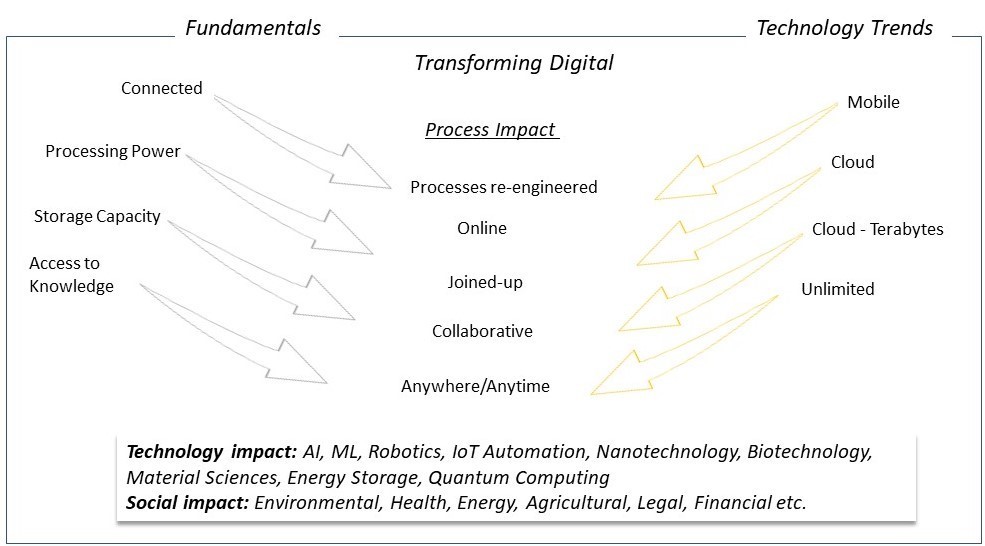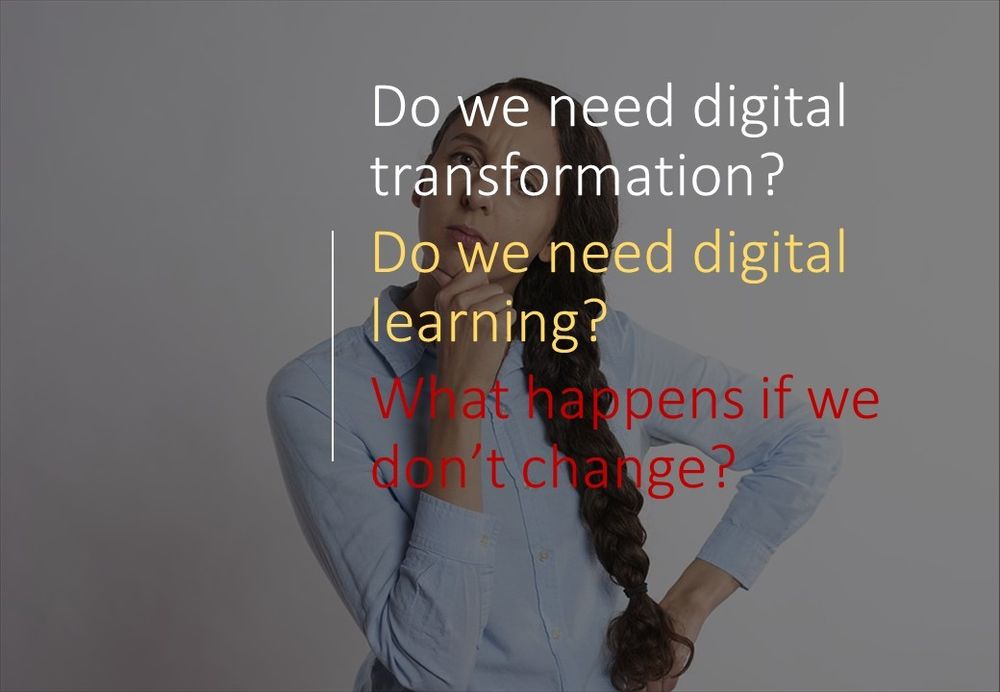Digital Transformation Affects All
Leaders Must Understand The Transformative Nature Of Digital Technology, The Opportunities & Challenges It Presents For Their Organisation
Business leaders and senior executives need to understand the accelerated changes taking place in their markets as a result of the increasing presence of emergent and fast-paced digital technologies. This phenomenon cuts across and impacts every aspect of business and social activities globally - agricultural, biological, financial, technical, commercial, leisure and entertainment and more.
Technology is reshaping everything related to the way we live, work and play. It is essential for business leaders and governments to understand what is transpiring and what is required to ensure their communities benefit from these changes. Leaders must also remain current and recognise the implications of the new technologies for their environments and customers.
That is not to say all need to become tech geeks but what is necessary is an appreciation of opportunities provided in new ways of collaborating for technology adoption, gaining market leadership and shielding against disruptive competition. In the case of government, this extends to reducing potential economic disparities for vast sections of society.
Technology has been a disrupter as far back as the industrial age. What is different this time round is the velocity and impact of the breakthrough is unprecedented. The degree of change is a result of:
- ubiquitous and connected environments.
- the breadth and depth of data available to inform for new products and service innovation.
- the responsiveness and awareness of demand-side customers who now have an appetite for continuous improvement on features and functionality of products and services on offer.
The new technologies present organisations with two broad challenges, (a) move with the tidal wave or (b) sink from inertia. There is no option to stand still.
Customer Demand Is Driving Change
All organisations, whether business or government, cannot afford to remain stagnant. The change occurring is not limited to a segment of society or marketplace and is overhauling much of what we do: e.g. it is evident in the retail sector in developed markets such as the UK where online retail has put a stranglehold on fixed retail outlets, resulting in unprecedent closures in the last 18 months.
Consumer habits towards food, clothing and household shopping has changed. Customers are ‘marching’ with their fingers and “click to buy” from the comfort of their homes; adding to the demise of physical presence on the high street.
Whether you are sitting in the USA, Norway or Rwanda, the disruption will affect every aspect of how you function in society. If it hasn’t reached you it is only a matter of time. The question therefore is, as a manager, leader, executive or legislator, are you making conscious decisions about how these changes will impact your organisation and the communities you serve or are you disregarding this phenomenon as a fad or more “rhetoric?”
Power Is In Connectivity & The Networks

Connectivity and processing power is central to the change taking place. Exponential increase in computer power is driving technology trends from AI and ML to drones and virtual assistants and the emergence of 5G is expected to further accelerate this progress because of its capacity to transmit and process vast amounts of data quickly to aid predictive analytics, algorithms and decision-making.
The combination of speed and data volume presents designers and architects with exceptional computational power across domains and will enable them to create new services e.g. in the health sector this transcends manufacturing, materials engineering and biology to generate solutions for remote monitoring of patient care, delivering personalised treatments and efficient management of buildings and facilities.
What Do You Do As A Leader?
Digital transformation may not be highest on your wish list. As a leader, you may have other pressing needs to deliver revenue targets, improve your operational processes or service delivery. For many leaders in government, including those in Africa and emerging markets who may perceive their primary focus as addressing ‘more pressing’ needs spanning public health, universal education, agriculture, food production, advocacy etc. you may even consider other technology focused departments e.g. your ministries of communications or ministries of science and technology as best place to react on behalf of government.
Indeed, digital transformation is not a panacea and cannot fix all problems of organisation and government. However, alongside good governance and strategy, it is a means to addressing these very challenges occupying the upper echelons of decision-making by leaders for resource allocation and funding. For organisations and businesses alike, it is also the most effective channel to improving productivity, operational efficiency and reskilling of the workforce.
It Is Beyond Technology
Of course the expected benefits of exponential increases in computer power through Cloud Technology and the advent of 5G mobile technology which is suggested will lead to vastly increased services sourced via mobile devices and online does not imply all activities under digital transformation is positive or likely to end with better outcomes. Poorly designed transformational initiatives are likely to present enormous challenges for organisations and governments.
Furthermore, even if future income levels increase and quality of products and services improve these same technologies are likely to create greater disparity between communities if affordability and accessibility remain a barrier to many globally. These factors add to the considerations leaders have to make on how and what aspects of the business need to undergo digital transformation and extend beyond technology.
Organisations of all sizes the world over are encouraged to transform for improved efficiency in operational and workforce performance, to lower costs of operations and effectively manage processes throughout the value chain.
Digital technologies are transformative technologies. Implemented correctly it will enable them to innovate for new products and services and agile delivery for faster turnaround and overall better customer service. Those who emerge as sector or industry leaders are likely to be the ones able to take advantage by immersing themselves fully in the new technologies and new business models it presents.
Applying Effective Transformational Tools
To overhaul organisations that are accustomed to and in some respects complaisant in managing their operational practices and employee development is enormous. However, it is not insurmountable depending on the leadership and organisation’s ability to embrace and adapt effectively through transformational processes and tools, which are also digital.
Success will also be determined by the organisational mindset for driving and implement digital technology centred transformational change. Change cannot happen in isolation. Furthermore, success will come to those who focus on: (a) adopting a clear vision and strategy aligned with organisational, team and individual goals for adoption of digital transformation; (b) create a secure operational environment adopting cloud technologies for processing power, efficiency and cost savings; (c) review, revise and reengineer business processes for efficient and improved productivity; and (d) provide the right tools to facilitate joined-up working and collaboration both internally and externally with partners and customers. Underlying all of this is the quality of continuous learning and development provided to reskill employees and the workforce.
The Learning Nuggets Can Support You On Your Digital Transfromation & Digital Learning Initiatives
For more information on how The Learning Nuggets Company can support your organisation through your digital transformation journey, organisational learning and development and employee/workforce competencies and skills development initiatives Contact Us now or Get In Touch by completing the form and we will get back to you.


